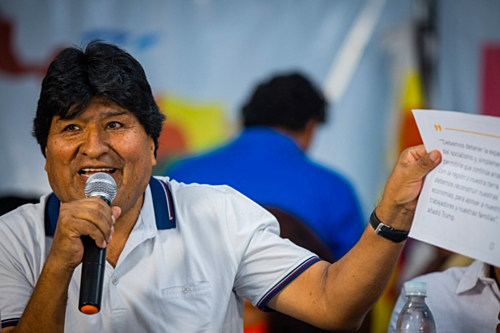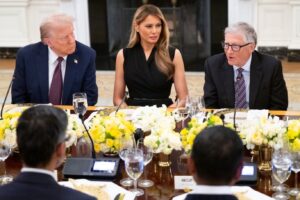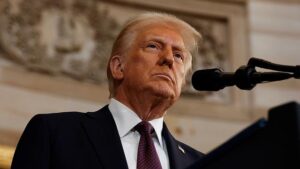
The Latin American Council of Justice and Democracy (Clajud), an entity linked to the Puebla Group, issued a statement this Tuesday (06/06) accusing the Peruvian government of promoting a lawfare operation against the former president of the Bolivia, Evo Morales (2006-2019).
Since January, the Peruvian State has been investigating Morales for an alleged “attack on national integrity”. The process was initiated by congressman Jorge Montoya, former commander of the Peruvian Armed Forces and parliamentary representative of the far-right Popular Renewal party. The military states that the former Bolivian president is behind “terrorist groups that, disguised as social movements, promote violent demonstrations and put the lives of police and military agents in charge of public order at risk.”
The basis of the accusation would be an event held in the Peruvian city of Puno, in November 2022, in which the Bolivian politician received the title of Doctor Honoris Causa from the National University of the Plateau of Puno (UNAP) and took the opportunity to participate in meetings with members of indigenous communities in the region.
Weeks later, after the dismissal of Pedro Castillo and the rise to power of Dina Boluarte, Peru began to experience a wave of almost daily demonstrations in different regions of the country. Puno is one of the cities that has registered the greatest number of protests, and also a strong police and military repression against them, which resulted in some deaths of demonstrators.
The government’s discourse to justify the violent action of the National Police and the Armed Forces that act to contain the protests is that they are not popular demonstrations, but “terrorist groups infiltrated in indigenous communities in the interior of Peru”. Evo Morales’ visit in November and some of his publications on social networks encouraging protest acts against the government are presented by the whistleblowers as “proof” of his alleged responsibility for this organization.
“The reason for the complaint, the complainant himself and the measure to prohibit Evo from entering Peruvian territory demonstrate the hostility and persecutory spirit against one of the most important figures of South American progressivism in the 21st century, and representative of the continent’s indigenous peoples, who already suffered a coup d’état in his country when he was president”, claims Clajud.
In addition to the prosecution in court, Morales was banned from entering Peru, by decision of the country’s National Migration Superintendence. The Peruvian National Congress also approved a resolution declaring the Bolivian as “persona non grata” – the same measure was imposed on the President of Mexico, Andrés Manuel López Obrador, for his frequent statements that question the legitimacy of the government of Dina Boluarte.
Read Clajud’s letter in support of Evo Morales in full:
Lawfare against Evo Morales from Peru
In January 2023, the Public Prosecutor’s Office of the State of Puno (Peru) initiated proceedings against the former President of the Plurinational State of Bolivia, Evo Morales, for the alleged crime of attacking national integrity, for which a prison sentence is foreseen. liberty for fifteen years or more. The complaint was filed by Jorge Montoya, former commander of the Armed Forces and current congressman of the ultraconservative Renovação Popular party.
The argument of the Public Ministry of Puno is that the Unity of Indigenous Peoples initiative promoted by Evo Morales, known as RUNASUR, implies a threat to the territorial integrity of the country. It is considered a crime to promote this initiative in a public act led by Evo Morales in Puno, in November 2022. The meritorious process did not respect any of the rights that correspond to any citizen within the framework of a democratic State. of law, in addition to being based on non-existent facts, from the moment that former president Evo Morales only went to receive the title of Doctor Honoris Causa from the National University of Planalto de Puno (UNAP), for his fight in favor of the native peoples, within the framework of the strictest respect for the regulations in force in Peru.
In this context, the National Migration Superintendence banned Evo Morales from entering Peru, with no argument other than persecutory intent for political reasons, while Congress declared him persona non grata.
The reason for the complaint, the complainant himself and the measure to prohibit Evo from entering Peruvian territory demonstrate the hostility and persecutory spirit against one of the most important figures of South American progressivism in the 21st century, and representative of the continent’s indigenous peoples, who he already suffered a coup d’état in his country when he was president.
The consequences could be very serious in the medium term, having fostered a chain of invalid procedural acts that are alien to the most elementary due process of law and that would seek to discipline, intimidate and even politically disqualify Evo Morales in pursuing his activity as an international leader, in yet another example of extraterritorial lawfare.
The Latin American Council of Justice and Democracy (CLAJUD) radically rejects this new attempt to exploit the right to serve spurious political interests against Evo Morales and we call on the international community and regional and international human rights organizations to become aware of what happened and work to condemn and stop this persecution.
Sign this statement:
Ernesto Samper Pizano (lawyer, politician and economist, Colombia)
Baltasar Garzón (jurist, Spain)
Marco Enríquez-Ominami (filmmaker and politician, Chile)
Camilo Lagos (president of Fundación Progressa, Chile)
Gerardo Pisarello (politician and lawyer, Spain)
Gisele Ricobom (lawyer, Brazil)
Eli Gómez Alcorta (lawyer, Argentina)
Silvina Romano (historian and social communicator, Argentina)
Adoration Guamán (jurist, Equador/Spain)
Virgilio Hernández (politician and lawyer, Ecuador)
Enrique Santiago (politician and lawyer, Spain)
Emilio Camacho (jurist, Paraguay)
Damián Loreti (lawyer, Argentina)
Larissa Ramina (lawyer, Brazil)
María Carola Iñíguez (experts in international relations and human rights, Ecuador)
Gisele Cittadino (jurist, Brazil)
Source: www.brasildefato.com.br

